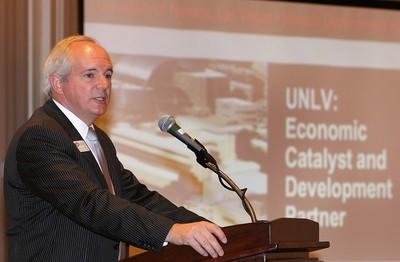UNLV seeks to wield economic clout

The University of Nevada, Las Vegas made its name on two fronts: hotel-management studies and championship basketball.
But the school’s officials want to make the university just as well-known for its efforts to foster diversification of the local economy.
UNLV’s administrators and professors are forming plans to assist economic development locally by boosting research at the college, improving the work force and enhancing the quality of life in Southern Nevada. To achieve those goals, they’re taking measures small and large, from raising admission standards to building a 3.2 million-square-foot research park, UNLV President David Ashley told a crowd of about 250 at a Thursday breakfast meeting of the Nevada Development Authority.
“We can be a development partner and help bring businesses to Las Vegas,” Ashley said.
The emphasis on economic diversification is a new direction for a school that focused on its own growth for much of the last decade, Ashley said. UNLV has expanded 7 percent a year since 1996, going from 19,683 students then to 28,000 students today, and from 1,700 faculty members 11 years ago to 3,300 professors now. Administrators have increased the university’s number of degree programs, from 148 in 1996 to 221 today, with an accent on new graduate degrees. The school also opened its first international campus in 2006, in Singapore, and is negotiating a second overseas outpost now.
Now, Ashley wants his staffers and professors to think more about long-term strategic planning on efforts to expand research activity, upgrade the reputation of UNLV and attract more-qualified and more-motivated students. Those improvements, said Ashley, will promote all the essentials relocating businesses want: a college-educated work force, quality public education, logistics infrastructure, quality of life and abundant and affordable health care, among others.
A high-caliber student body begins with more selective admissions, so officials are raising the minimum grade-point average for acceptance into UNLV from 2.75 now to 3.0 in 2008, with additional upward bumps possibly to follow, Ashley said.
Several new building projects are advancing research capabilities at the school as well.
A science and engineering building with more than 200,000 square feet of classroom and lab space will open in 2008. The project is helping UNLV recruit scientists from around the world, Ashley said.
Plus, planning is under way on the 114-acre Harry Reid Research & Technology Park in southwest Las Vegas, near Interstate 215 and Durango Drive. The site will include offices, research and development labs and light manufacturing buildings.
“The purpose (of the park) is to create opportunities for businesses and the university to mix around research,” Ashley said. “We want faculty, students and companies to collaborate, and we want companies to hire our students.”
UNLV is already spearheading research in alternative fuels such as solar and wind power and hydrogen, and the school’s faculty are also involved in the design of software and support systems that prevent identity theft and protect computer networks. The university is also positioned to lead research in childhood behavior, public health, sustainable urban planning, energy efficiency in buildings, and transportation issues. And the research labs that host such scientific and intellectual inquiry often generate startup businesses, Ashley said.
Ashley also pointed to UNLV’s effects on Las Vegas’ quality of life. Few businesses will relocate to a city with crowded schools and poor access to health care. By providing more teachers and nurses, UNLV’s education and nursing programs will play critical roles in improving public schools and hospital services. The university will also serve as a cultural touchstone in the community, with arts programming and Midtown UNLV, a planned mixed-use project along Maryland Parkway that would include condominiums, shops, office space and cultural centers.
So here’s Ashley’s dream scenario: A company based in another state establishes a small presence in Southern Nevada to work with vendors and clients. Thanks to UNLV’s research activities, its steady stream of qualified graduates and its contributions to stability in health care and public education, the company considers Las Vegas as a site for a regional or even national headquarters office. The more business executives who think like that, the more diverse the city’s economy will be in the long run.
“We’re poised to be a real catalyst in economic development,” Ashley said. “We think it’s incredibly important to develop a vibrant community and a vibrant economic base.”